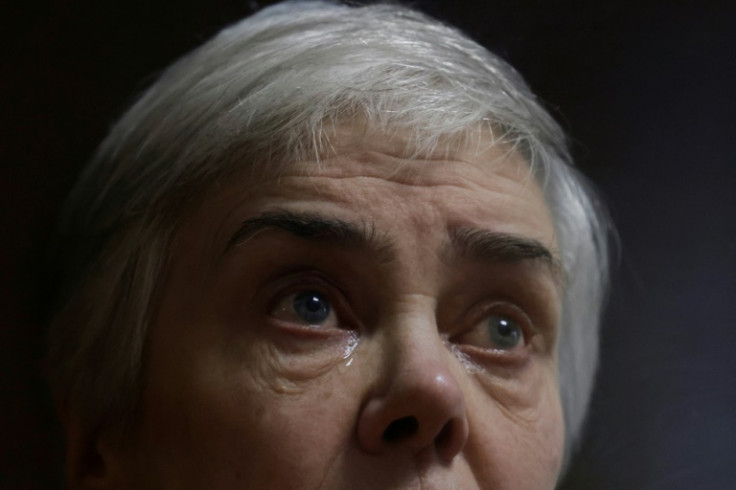Russia Seeks Six Years For Medic For Criticising Ukraine Campaign

Russian prosecutors on Friday demanded a six-year prison sentence for a paediatrician accused of criticising the Ukraine campaign during a private appointment, in a case that has revealed the extent of repression gripping Russia.
Nadezhda Buyanova was reported to the police by the ex-wife of a soldier missing after fighting in Ukraine -- Anastasia Akinshina -- who accused her of calling the man a "legal target of Ukraine."
The 68-year-old was arrested in February and has been in pre-trial detention since April.
The case against Buyanova is built without public evidence the conversation ever took place and after Akinshina's seven-year-old son testified against her, in a practise reminiscent of Soviet-era denouncements and trials.
Handcuffed behind a glass defendant's cage in a court hearing on Friday, the Moscow medic cried and said: "I am innocent."
Buyanova's case has been singled out in Russia -- which has seen hundreds of trials against people accused of criticising the Ukraine campaign -- as particularly harsh.
Many have pointed to her birthplace -- Ukraine's western city of Lviv, which Russia has painted as the root of all evil -- as a reason for such treatment.
Buyanova, who has lived in Russia for more than three decades, has been accused of "personal" hatred towards Russia -- something she denied in court.
"I was born in the city of Lviv, a city in the Ukrainian Soviet Socialist Republic," she said, sobbing after prosecutors announced they were seeking a years-long prison sentence.
"What kind of hatred can I feel? I am related to three Slavic peoples: Russia, Belarus, Ukraine," she said.
"I am not a politician... I am just a doctor," she said.
Buyanova is charged with spreading "fake" information on the Russian army, under military censorship laws used to silence dissent.
Buyanova's defence said there is no audio recording of the conversation, that Akinshina's child was interrogated by the FSB security service and that his testimony used wording unlikely to have been used naturally by a child of his age.
Buyanova has denied the charges.
"None of this happened," Buyanova said in court Friday, saying that Akinshina had made up the conversation.
Akinshina had at the start of the trial said her son was not present in the room when the dialogue took place.
But in a court hearing over the summer, the boy said that Buyanova had alleged, "Russia is an aggressor country and Russia kills peaceful people in Ukraine."
He also said that Buyanova had called his father a "legal target for Ukraine."
"I saw that boy... These were such adult phrases, such scary ones. I doubt that those were his words," Buyanova said in court.
Lawyers had asked if the boy was pressured, but the court refused to consider the complaint.
"It is obvious the boy could not remember or understand such phrases like 'legal target'," Buyanova's lawyer Oskar Cherdiyev told reporters.
"There are no witnesses of the conversation," he added.
He also decried the treatment of his client.
A photograph of Buyanova standing in her trashed Moscow apartment after it was raided by security services, was shared widely on the Russia internet in February.
And at a hearing last month Buyanova said she suffered a head injury after a van bringing her to court had braked suddenly.
"Life did not spoil me. I did not have an easy life. I am from a simple family," she said, her voice breaking, prior to the hearing.
A dozen people, mostly medics, came to support Buyanova -- whose first name, Nadezhda, means "hope" in Russian -- in court.
"The whole situation is absurd," said a 49-year-old child psychologist, Arina, told AFP.
"The only thing we can do is to show Nadezhda that she is not alone... That there are people who are hoping for a miracle," she said.
© Copyright AFP 2025. All rights reserved.





















